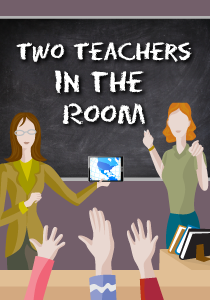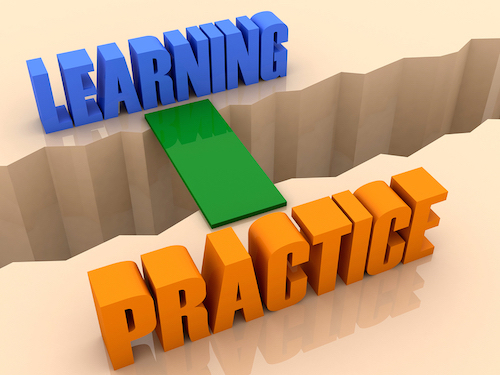Our Obsession with Testing Disrupts the Learning Cycle
A Middleweb Blog

I am fired up with frustration, I am exhilarated by determination and dedication, and I am soothed by hope and anticipation of what the power of collaborative teacher voices can do for students.
A co-teacher leaves the system and the CCSS
You may have heard about Stacie Starr who is a veteran intervention specialist from Elyria, Ohio. Starr was named the winner of the “Live! with Kelly and Michael” 2014 Top Teacher Search. Starr is resigning from teaching due to the realities of the Common Core testing. She is a 14-year veteran special education teacher and co-teacher at the high school level.
Starr has dedicated her life to guiding students who struggle with content area material. She has experienced the pure joy in watching her efforts translate into her students’ personal success stories. “It brings me so much joy—watching children not understand at first and then grasping it and seeing their amazement in being able to do it—it just means the world to me.”
Starr has worked hard to make co-teaching work as she and her colleagues sought to deepen students’ connections and understanding. And her experiences support what all effective co-teachers know: students with learning disabilities need more time. They need more time to process, connect, and apply. And given the proper scaffolds and supports, they can experience meaningful learning.
Time has run out
But reality took over. There just isn’t more time. There is this race to absorb content in “drill and kill” ways—just in time for the tests. But what about the PROCESS of learning? Where is the gift of time that students need to really connect to the learning process? Where is it found inside our current secondary school system? Simple answer…it isn’t.
Starr could no longer remain silent throughout her day-to-day life inside the confining educational system. The pressure of knowing there wasn’t time in the school day to help her students close their personal achievement gaps finally brought her to make a move. Here’s what she says:
I can’t do it anymore, not in this ‘drill ‘em and kill ‘em’ atmosphere….I don’t think anyone understands that in this environment if your child cannot quickly grasp material, study like a robot and pass all of these tests, they will not survive.”
When test prep replaces teaching

This is not teaching. Teaching requires a person being human enough to connect to what students need in order for them to connect to the facts they must know. A teacher inspires and guides students to know themselves as learners. And these learners become strategic, systematic thinkers who know how to learn—for the sake of learning itself. Not for any test.
As I read Starr’s story, I wondered — Why can’t secondary level classrooms engage students in an extension of the excitement of learning that began when they were younger? Yes, the secondary levels clearly have more content they must teach. More tests loom all around to create a heavy cloud of pressure. But if we actually connected the educational levels in a systematic way so that all learning was truly built upon prior experiences, that pressure might ease as schools exerted more “self accountability.”
A disjointed system hallmarked by isolation
Currently each level in the disjointed public school system operates in isolation, with educators at other levels demonstrating little interest in what comes before or after. At the elementary level, students gain a solid foundation of facts, but they also tap into who they are as learners. They are just beginning to apply the processes needed to help them to connect to the content. They are well on their way to being strategic life-long learners.
Then students move to middle school. The content is heavy, deep, fast, and furious! It is truly an academic haven of fact, and truly exciting! Yet it seems like, in the rush to cover everything, we break the connection between the individual learner and the content. Students no longer have a chance to practice the process of learning in the general education setting.
As a result, co-teachers are left to fend for themselves in too many cases. Students find themselves scrambling for ways to grasp the information and fill in personal learning gaps. But because there is not enough time—and often not enough resources—these students end up depending on a teacher to give them “just the facts”—the study guide. It is the opposite of how and what they learned at the elementary level. And achievement gaps persist and grow through the secondary years.
And then there’s high school. The level of facts continue to deepen, and the process seems to wrap around just preparing for endless classroom tests and more tests that students need to graduate, so they can get out of a system that (at least in the case of students with special needs) has misguided, misdirected, and knocked them down for too many years.
These high school students who struggle to grasp the concepts were once the eager elementary learners who applied strategic thinking and an excitement to learn, to read, and to explore and connect to their individual strengths. What has happened? What is the real purpose of education in our current off-kilter, fragmented system? How do we bridge the gaps?
Stacie’s future in teaching
On a happy note, Stacie Starr will continue to work her magic with students. She is planning to start an afterschool mentor program where she will support students in real learning processes—not just the overly regimented, passive learning modes they experience during their school day.

As for now…I think I’ve said enough for this week.




































Thank you for this post, Elizabeth. I see this happening all too often and even in places that aren’t burdened by the pressures of high stakes testing…at least not yet. As a grade 6 teacher this year, I wonder at how those inquisitive, respectful grade 5 students I knew last year have metamorphosed into something that is quite the opposite of that. As I transition into teaching grade 5 next year, I am going to be encouraging my students not to abandon the path of independence and life-long learning when they move into grade 6. I’m considering following them through their grade 6 year to see how they fared in this respect. Could this be a teacher research project in the making?
Elisa, thank you for your comment. Creating meaningful learning environments for students is such an invigorating and rewarding task. And it can also be a very challenging (but always doable!) task in co-teaching situations. It’s so refreshing to connect with your passion, curiosity, and diligence to give students all we’ve got throughout their school careers (and beyond!). I would love to keep in touch–we could share our action research findings over time!
All the best!
Don’t you think the basic disconnect between teacher belief in the curriculum and test scores? What if we taught the curriculum and then looked at the scores? It would take bravery like we haven’t seen, but it seems the only way to fight this kind of teacher fatigue and it would force districts/states to build curriculums that would yield the test scores they want.
Marsha–thanks for sharing your voice here! Your insights and perspective always spark the bravery in all of us!
I currently work in a Montessori setting and the idea of teaching for the test seems so crazy for me. Children at our school share what they learn to the teacher or help another child to learn the task. This shows that they truly understand the concept. There for the most part isn’t a “test” to prove what is learned. Children memorize facts and figures for a test. I wonder how much of it they remember after putting it down on paper. Learning is a process that is different for many of us. Reading a piece of paper over and over to memorize it doesn’t work for all students. Many children need to be actively engaged in an activity to remember something. How is this accommodated? Finding a way to keep learning fun inventive and enjoyable for children is something we should all strive for and great test scores will come with it.
Nancy, you’re spot on! Learners must be actively engaged in the process in order to remember. They must attach meaning by being free to move, to think, to listen, to speak, and to value their thinking. Universal Design for Learning (www.cast.org) is an endless source of ideas on how to scaffold the learning process, so that it is enjoyable for students. It’s all about the process! Thanks so much for adding your spark to this conversation.
All the best!
I think we all got into teaching for all the right reasons, and became excited about the idea of teaching, but sadly, for many of us that excitement has been replaced with doubt, resentment, and sadness. Sadness for what we see our students go through. I am constantly hearing comments like “I hate school”, “School is boring”, “I thought school was suppose to be fun”, “I can’t be creative”. It breaks my heart when I hear such defeat from my students. The sad part is I think the same things at times. When did learning only become about numbers and tests? What happened to getting to know your students as human beings and finding their potential? And I’m sorry it’s even worse for students with exceptionalities. They are usually just passed over, and not given much thought because they lower the rating scale for a school, they can’t up the ante for a school, so why bother. It’s frustrating and sad. I thought education was supposed to be a priority, yet, a school must do well in order to get funding? So schools in poorer areas with low test scores get less funding and less support, allowing them to continue in this cycle year from year. What happened to every citizen having a legal right to the best possible education? Schools have become a business and we can thank people like the Gates for that. Students are no longer human beings, but numbers to help increase funding for a school. I truly worry about where the educational field is going and what about our students, where does that leave them?
There have been many days that I, like Stacie, have thought about leaving the classroom. My district just finished administering the first round of PARCC and it was brutal. I had 15, 3rd grade students all who either had an IEP and/or are in a bilingual program that I administered the test to over five days. I felt like a monster and a failure that week. I was asked, “why are you doing this to me? Are you mad at me, is this punishment? Can you please help me?” I also heard, “I’m too dumb to do this. I hate school! I hate you for giving me this test!” Not only were the students distressed but we also lost over 12 hours of instructional time that week. This is just one of the tests I am required to give throughout the year. My students are forced to sit through approximately 40 hours of testing a year and this does not include any testing I administer to assess attainment of curriculum. With all of the instructional time lost on testing, many of the “fun” activities I typically complete with my students have be pushed aside to make way for the assessments. I have seen it trickle down to the primary students too. Our primary teachers know what our students are facing in their futures and have cut out the hands-on activities. I hope one day soon we can go back to teaching students the way the learn best and stop assessing them so much.
Hi, Annette and Lindsay,
Thank you so much for sharing your thoughts. Our shared voices not only help to support our personal /professional growth, but also serves to connect and comfort colleagues near and far! Thank you.
Teaching has definitely evolved into a process that forces some beyond frustrating realities on our path. It takes great resilience, patience, and determination to stay focused on the process of meaningful learning experiences with our students. Our instructional decisions empower our students for real life experiences. We know that tests will never define our students.
Keep on creating a meaningful learning process each day!
All the best!
Elizabeth thank you so much for your kind words. I am just now seeing this blog! It has definitely been a struggle this year. I am finding it harder and harder to make it through the end of the year but only remain there because I know my students would be devastated if I left earlier. At the freshman level testing is consuming our teaching. I have had the highest failure ratings ever. So now are my students not only struggling to pass the test but also struggling to get their credit for high school. Absolutely breaks my heart! We are going to lose a whole population of struggling students.